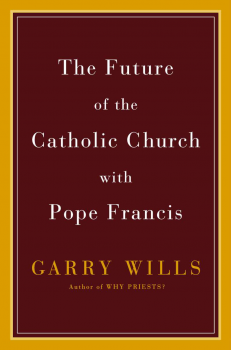Book: The Future of the Catholic Church with Pope Francis

The Future of the Catholic Church with Pope Francis by Garry Wills, Viking Books, 2015
Progressive Catholics who hope Pope Francis will reform the Church will find Garry Wills's latest tome bristling with talking points that might come in handy in discussions with more traditionalist coreligionists. For instance, contends Wills, it is nonsense to say women cannot be ordained because Jesus did not ordain any, when Jesus didn't ordain men either.
Conservative Catholics, on the other hand, would do well to consider Wills's learned and elegantly written arguments in the spirit of knowing thine enemy.
In summary, he believes the church must change - as it always has - to stay alive. To prove his point he deploys his impressive knowledge of Biblical and theological sources in Greek and Latin to demolish past embarrassments such as demonising the Jewish people. He points out that until relatively recently Catholics were told to avoid the ecumenical movement because, "one should not recognize the right of the other "religions" to exist when there is only one true religion." Thus Catholics could not enter Protestant churches or synagogues even for weddings or funerals.
He maintains Latin services survived as long as they did due to nostalgia and snobbery, but also to exclude the masses, keeping priests revered and mystic, with a monopoly on power. He shows that Latin was not the universal language; nor was it authentic, since the Bible was written in Greek.
Wills wants Pope Francis to tackle the issues the Holy Father himself refers to as the neuralgic obsessions with the pelvic region, such as contraception and abortion. Since there is no Biblical basis for these prohibitions, popes have relied on "natural law," what is "nature to human beings," or more often what any given pope says is natural. Accordingly Pope Pius XI discouraged debate or even thought when he wrote, "Let the faithful also be on their guard against the overrated independence of private judgment and that false autonomy of human reason."
Natural law was clear that the purpose of intercourse was procreation only; morality as defined by biology. Wills reminds us that at one time Catholic theologians were against amputation because it was against the natural order, and similarly blood transfusions and transplants. "If sterilization was condemned as mutilation of the body, what about other "mutilations" like cosmetic surgery, trying to "improve" nature?" Wills asks.
Along the way one learns how few Christians were actually fed to the lions, and how in the early days there was a distressingly Islamic jihadist-like enthusiasm for martyrdom. This morphed into what Wills calls the "virtual martyrdom" achieved by monastic asceticism and self-denial.
Wills points to the success of Saint Augustine, under Pope Gregory, who with only 40 monks converted England by making the faith accessible and culturally relevant. In the same manner Jorge Bergoglio encouraged his Jesuits in Argentina to respect the theologically incorrect rituals they found popular with local Catholics. It worked for the future Pope Francis, although it was disapproved of by those who preferred intellectual purity to bums in pews.
Wills gets into his stride when dissecting the tenure of Pope John Paul II. He quotes The Tablet's Peter Hebblethwaite at length on JPII's strict litmus test for appointing bishops: "Opposition to contraception, to the ordination of married men and even the discussion of the ordination of women has been made the criterion for becoming a bishop. ...The result is that John Paul has created an intellectual desert and called it peace. Bishops and theologians have been cowed into silence."
Consequently, Wills argues, it produced, "a huge army of ecclesiastical yes-men. People willing to meet his requirements would naturally tend to be mediocre in intellect or character, willing to use what abilities they had to repress the superior insight or initiative of outsiders."
When considering why so much child abuse persisted, he asks rhetorically, "How could men trained in submission as apparatchiks of Rome muster the wisdom, empathy, and resolution to face such an issue? Every instinct of their situation told them to stay ignorant, or feign ignorance, or evade , or hide- anything but face or prevent or do penance for the multiplying scandals...Acting otherwise would have required courage, and openness, and humility, from which they had been systematically disabled."
Others have written at much greater length about whether or not Pope Francis is a liberal or a reformer, a conservative who sided with the junta during Argentina's dirty war, or whether he simply failed to defend those priests persecuted and killed for their embrace of liberation theology. However, Wills seems prepared to wait and judge Francis on his actions, rather than his track record. Nevertheless he concludes with the words of Jorge Bergoglio's biographer, Paul Vallely: "Bergoglio wanted to alleviate the symptoms of poverty; Arrupe [one of the leading proponents of liberation theology] wanted to challenge them."
Beautifully written and bracing, this book will annoy as many people as it provides with elegantly-formed ammunition.















